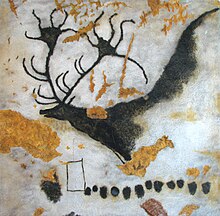...silhouette...
Now, the thing I want to know is, were there silhouettes before M Silhouette, after whom they are named, came along? Plainly there must have been, because M Silhouette died in 1767 and people would have been walking along hill-tops against the sky for hundreds of thousands of years before that.
But did people recognise the sight of them as a something special? Was Neanderthal man, as he tied on his wolf skins, aware that draping the shaggiest bit round his shoulders would make him look extra manly and strong, but that if he tied it round his waist he was going to look as if he'd eaten a whole mammoth himself?
Well, I don't know about Neanderthals, but the art of ancient Homo sapiens uses silhouettes:

Megaloceros at Lascaux
and Shakespeare talks about a walking shadow, which must be pretty much the same thing, as must have been the shadowy people who walked across Plato's cave's walls.
That being the case, what's really surprising is that we didn't have a word for a silhouette before.

Johann Caspar Lavater Zentralbibliothek Zürich project
Word To Say Huskily Today: silhouette. This word is named after the French politician Étienne de Silhouette, 1709 - 1767. He was controller general, the official in charge of government finance, for eight months during 1759 - 1760. In order to raise money for the Seven Years' War and reduce the French deficit he devised a system of taxation that was based on lifestyle (windows and servants, for instance) and profits. His penny-pinching was very unpopular and anything seen to be cheap or austere was called á la Silhouette. Cut-paper shadow-pictures were becoming fashionable at the time, and of course they were being sneered at for being designed for those too poor or cheap to have a proper portrait taken, so they, too, were called after M Silhouette.
Étienne de Silhouette had a lot to recommend him, all the same. For one thing, he translated Alexander Pope's works into French. Good for him.
Talking of austerity, perhaps it's a surprise we never had an osborne. I wonder what it might have been?
No comments:
Post a Comment
All comments are very welcome, but please make them suitable for The Word Den's family audience.